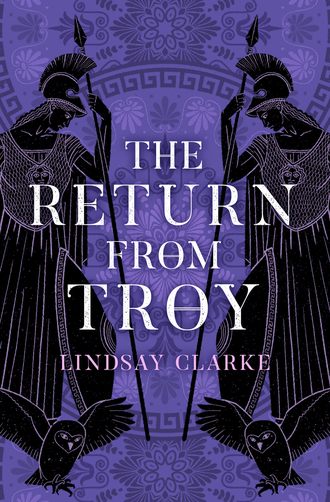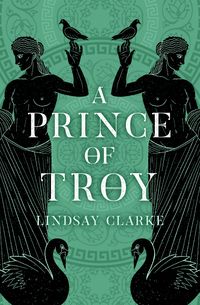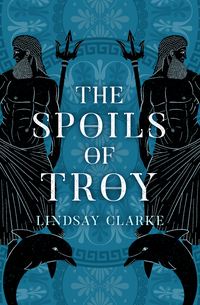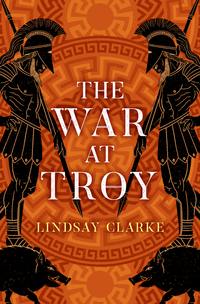
Полная версия
The Return from Troy

THE RETURN FROM TROY
Lindsay Clarke

Copyright
HarperCollinsPublishers Ltd
1 London Bridge Street
London SE1 9GF
www.harpercollins.co.uk
First published in Great Britain as part of The Return from Troy by HarperCollinsPublishers 2005
Copyright © Lindsay Clarke 2005
Map by Andrew Ashton © HarperCollinsPublishers Ltd
Cover illustrations © Shutterstock.com
Cover design © HarperCollinsPublishers Ltd 2019
Lindsay Clarke asserts the moral right to be identified as the author of this work.
A catalogue copy of this book is available from the British Library.
This novel is entirely a work of fiction. The names, characters and incidents portrayed in it are the work of the author’s imagination. Any resemblance to actual persons, living or dead, events or localities is entirely coincidental.
All rights reserved under International and Pan-American Copyright Conventions. By payment of the required fees, you have been granted the non-exclusive, non-transferable right to access and read the text of this e-book on screen. No part of this text may be reproduced, transmitted, down-loaded, decompiled, reverse engineered, or stored in or introduced into any information storage and retrieval system, in any form or by any means, whether electronic or mechanical, now known or hereinafter invented, without the express written permission of HarperCollins.
Source ISBN: 9780008371104
Ebook Edition © September 2019 ISBN: 9780008371098
Version: 2019-09-25
Dedication
For Phoebe Clare
Contents
Cover
Title Page
Copyright
Dedication
Map
The Pledge Redeemed
The World Turned Upside Down
Zarzis
The Young Lions
Nobodysseus
The Wind-Callers
A Game of Shadows
Telemachus
The Mysteries
Menelaus
The Homecoming
The Winnowing Fan
Glossary of characters
Acknowledgements
Also by Lindsay Clarke
About the Publisher
Map


‘A Prayer to Odysseus’
(Inscription found on a terracotta fragment in ‘the Cave of the Nymphs’ on Ithaca)
The Pledge Redeemed
Whoever finds these papyrus scrolls will see from the inscription on their urn that they are offered in prayer to Odysseus. They contain a reliable account of the ordeals and initiations he underwent on his journey home from Troy, along with the story of the fate of the House of Atreus and the other Argive heroes. By the end of the day I shall have concealed the whole collection of scrolls in the Cave of the Nymphs, hoping that they will be found in better times when men may be ready to listen to tales other than those sung in praise of war. Meanwhile, they must stand in fulfilment of the pledge I made one winter night in Ithaca when Odysseus sought to make peace with his own turbulent past.
‘You are an honest man, Phemius,’ he said to me that night, ‘if not always as wise as you believe yourself to be. You are also my bard and the time has come for me to share with you things that I have told to no-one else except my wife. I do so trusting that one day you will make a fine song of my story – a song by which the world will come to know what kind of man Odysseus truly was. And it will be a song unlike all the other songs because it will show that the ordeals he endured on his long voyage home from Troy were more marvellous, because more human, than all the extravagant inventions of the poets.’
When Odysseus asked me if I would do him this service, I vowed that I would. So now, remembering the solemnity of that moment, it is my earnest prayer that his revered shade will believe that, in the many words written in these scrolls, the pledge I gave to him that night has been faithfully redeemed.
The World Turned Upside Down
A brand from the burning city of Troy was used to light the triumphal beacon fire on Mount Ida. Within minutes the signal was spotted by the picket of Argive scouts camped on a mountain peak sacred to Hermes on the island of Lemnos. From there the fanfare of flame leapt across the Aegean to the rock of Zeus on Mount Athos, and thence down the mainland, from summit to summit, through Thessaly to Locris, from there into Boeotia and Attica, and on across the Saronic Gulf until at last a beacon was lit on Mount Arachne. That blaze was seen by the watcher on the crag at Mycenae, and there the fiery signals stopped.
Having all the information she needed, Queen Clytaemnestra was possessed by no urgent desire to share it further. So the western kingdoms of Argos would have to wait for runners to bring the news; and Ithaca must wait still longer, for the Ionian Sea was tormented by gales throughout that wintry month, no ships were putting out, and we might have been as distant from the Peloponnesian mainland as we were from Troy itself.
Then the winds abated and the seas calmed down. A Phoenician merchantman, damaged by the gales and blown off course for the island of Sicily, put in for repairs at a haven on Zacynthos. Two days later an Ithacan fisherman who had been stranded there returned to our island with the news that the Phoenician captain had heard about the fall of Troy just as he was putting to sea again from Crete. It was rumoured that the Trojans had been completely wiped out and that the Argive host had taken a stupendous quantity of plunder.
Telemachus and I were in town on the morning that the excited fisherman pulled his boat up on the strand, so we were among the first to hear the news. I jumped up and down in the sand and gave a little skip; then I turned and punched Telemachus in the shoulder. ‘Did you hear that?’ I shouted, amazed that he was not more excited. ‘We’ve won. It’s over. Troy’s done for. It can’t be long before they all come home.’
‘Be quiet, Phemius,’ he said, and he turned to the fisherman – his name was Dolon – asking whether there was any news of his father. Unfortunately, Dolon was not the brightest of men, and he was passing on what he had learned at third or fourth hand, so none of us could make much sense of what he had to say about the crucial role played in the fall of Troy by a cunning horse belonging to Odysseus. It wasn’t long before Antinous and Leodes, two of the young men of the island who had been drawn down to the strand by Dolon’s shouts as he drew his boat ashore, accused him of spreading fanciful gossip.
‘No, no, it’s true,’ Dolon protested. ‘They were dancing on Zacynthos when I sailed. Already they are feasting in Same. It’s true, I tell you. It’s all true.’
‘But my father’s alive?’ Telemachus pressed. ‘They said he was alive.’
‘Oh yes, Odysseus is alive,’ Dolon answered with a grin that exposed his few remaining teeth, ‘he’s alive all right and no doubt covered in gold these days. We shan’t know him when he comes back. He’ll be chiming like a herd of goats with all the gold dangling about his person.’
Antinous, who had been drinking wine, sneered at Telemachus, saying, ‘I can’t think why you’re so excited. You won’t know him anyway. And I can’t see Odysseus being at all happy about sharing your mother’s bed with you.’
Telemachus glared up at Antinous with his mouth open and his fists clenched, but this handsome lout was well over a foot taller and more than ten years his senior. If it came to a fight, there was no doubt which of them would win, and both of them knew it, which was why, in the absence of Odysseus, Antinous took malicious pleasure in keeping warm the bad blood between their two families.
Antinous was the son of a prosperous baron called Eupeithes who kept court in the north of the island on the far side of Mount Neriton. He was a distant kinsman of King Laertes, but there was little warmth between them, and Odysseus had not been surprised when Eupeithes contributed two small ships to the Ionian fleet but declined to go to the war himself on the grounds of ill health. Some years earlier the man had revealed a cowardly and duplicitous side to his nature when he came sweating into the palace late one afternoon seeking refuge from the wrath of his own people. Soon afterwards a band of shepherds were hammering at the outer gate demanding that he be handed over to them.
Things only came clear when a spokesman for the shepherds was admitted to the palace. He claimed that Eupeithes was in league with a gang of Taphian pirates who had recently despoiled several villages on the coast of Thesprotia. Some kinsmen of the northern Ithacans who had settled there a generation earlier had refused to pay these pirates for protection. Days later they had seen their crops and houses burned and their cattle and sheep run off. Three men who tried to resist the pillaging had been cut down. And when King Laertes demanded to know what any of this had to do with his cousin, the shepherd answered that cattle bearing the brand of one of the Thesprotian farmers had been found among Eupeithes’ herd.
Though Eupeithes at once denied the charge, his guilt had been immediately evident to Laertes and Odysseus. They were unconvinced, however, that he deserved to die for his unsavoury part in the affair. ‘Let me reason with him,’ Odysseus suggested, and Eupeithes soon found himself entangled in the devices of a subtle mind. Beguiled by his kinsman’s understanding manner and mistaking it for sympathy, he ended up confessing that he had been a fool to get mixed up with the pirates in the first place. Moments later, he saw the sense of it when Odysseus muttered that the only way that Eupeithes could now save his skin was by paying generous compensation.
Relations between the two men had been uneasy ever since, and when he was recruiting warriors for the fleet he would take to Troy, Odysseus had been in no doubt that he would rather leave such an unreliable character at home than have him fighting at his side. Briefly he considered drafting Eupeithes’ eldest son Antinous, but the boy was not yet twelve at the start of the war and Odysseus guessed that he would probably turn out to be more trouble than he was worth. So Antinous had stayed at home, where at every opportunity he took pleasure in humiliating Telemachus.
The two of them stared at one another now, Telemachus quivering where he stood, Antinous smirking down at him. Beside them Leodes gave a little snigger of contempt. Flushing, Telemachus turned on his heel and walked away. I was about to follow him when I saw our friend Peiraeus among the people hurrying down to the strand where the fishwives had begun to sing and dance. Anxious to divert attention from what had just happened, I called out the news.
‘Now you’ll really have something to sing about,’ he said as we caught up with Telemachus. ‘You’d better start working on a song for when Odysseus gets back. It can’t be long now.’ Then he took in the taciturn frown with which Telemachus was staring at the sea. ‘You don’t seem too cheerful about it. Why the long face?’
But though Telemachus flushed again, he failed to answer.
‘Antinous is a fool,’ I said. ‘Take no notice of him.’
‘What did he say this time?’ Peiraeus asked.
When Telemachus still said nothing, I muttered ‘It was nothing. Just some stupid remark about our not recognizing Odysseus when he gets back.’
‘But he’s right,’ Telemachus snapped. ‘I won’t know him, will I? I’ve no idea what he looks like. He’ll be nothing more to me than a glorious stranger.’
Again he turned away and walked on ahead of us, taking the path that led around the hill towards the southerly shore where the pale glare of a wintry sun shimmered across the sea. Peiraeus and I looked at one another, wondering whether to follow him, both of us aware that in his injured pride the boy might stay glum and sullen for hours now, even with us, his friends.
‘Aren’t you going to the palace to tell your mother?’ Peiraeus called after him.
‘She’ll find out soon enough,’ he said without looking back. ‘You can tell her.’
‘But she’ll want to share the joy with you,’ I protested. ‘What shall I say you’re doing?’
Telemachus stopped in his tracks for a moment. I watched him struggling with his feelings, a turbulent eleven-year old with a fearsome frown, who eventually pushed back the shock of tawny hair that fell across his brow and said, ‘Tell her I’ve gone down to the Cave of the Nymphs. Tell her I’m making an offering for my father’s speedy return. Tell her what you like. I don’t care.’
In the event, I discovered later, he did neither. Instead he walked to Arethusa’s Spring where he stood scratching the back of a fat sow that the swineherd Eumaeus had penned away from the rest of the herd while she suckled an early litter. From there he could gaze southwards across the sheer fall of Crow Rock to where the island of Zacynthos lifted its blue-grey blur on the horizon. A strait of water separated the island from the mainland, and it was through that strait that his father’s fleet of ships would sail on the day of their return.
Telemachus had been looking forward to that day for as long as he could remember; yet now that it was at hand he was filled with unexpected trepidation. What if he didn’t like the man? After all the marvellous things he had been encouraged to believe about him, wasn’t he bound to be a disappointment? Still worse, what if his father should take a critical look at him and form the same low opinion of his son as Antinous held? Again Telemachus flushed at the thought. Big as Antinous was, he should have bloodied his nose down on the strand and taken the punishment it brought, rather than turning away and saying nothing. What would Odysseus, sacker of cities, the hero of the war at Troy, make of a son who backed down before a bully’s jibes?
With her farrow beginning to snatch at her teats, the sow snorted and waddled away across the grass towards the shade of a holm-oak, where she dropped her hind legs and collapsed, grunting, onto her side. Squealing, the piglets clambered over one another in their haste to plug their small snouts to her belly.
Telemachus was staring at them, wishing he was older, wishing he was bigger, when a voice behind him said, ‘Niobe’s a good old sow. Farrowed a dozen she did, and she’s still suckling the lot.’ He turned and saw Eumaeus standing there with his grandfather, old King Laertes, leaning on his staff at his side.
In his rough smock and tattered straw hat, Laertes looked more like a peasant farmer than the lord of all the islands. ‘It’s good to see you taking an interest, Telemachus,’ he smiled at his grandson. ‘Your father’s head was always full of ships and the sea when he was a boy. He loved the island well enough, but he was restless – thinking more about what lay over the next horizon than what was here in his own back yard.’ Shaking his head, Laertes squinted into the glare of light off the sea. ‘Odysseus wasn’t like you – he never had the patience to make a good farmer.’
Telemachus had heard this complaint a number of times before. Each time it was uttered he noticed the only half-suppressed note of admiration – of envy almost – in the old man’s voice – as if the old king loved, and missed, his errant son a great deal more than he cared to admit.
Eumaeus said, ‘There’ll be time enough for him to learn patience when this war is over and done with.’
‘It’s finished,’ Telemachus said, almost dully. ‘Troy’s fallen. We’ve won.’
The two men looked at him in some bewilderment. The news, if it was true, was tremendous, but it had been announced with so little excitement that they thought the boy must be imagining things. Seeing their uncertainty, Telemachus allowed himself to smile. ‘It’s true,’ he said with more elation. ‘Dolon the fisherman got back from Zacynthus an hour ago. He heard the news there. He’s telling everybody. Troy’s beaten. They’re singing and dancing down in the town.’
‘You’re sure of this, boy?’ Laertes demanded.
But the swineherd was frowning dubiously as he said, ‘Dolon’s got fewer wits than he has teeth.’
‘I know,’ Telemachus replied, ‘but he seems certain of it. He heard it from a Phoenician trader who’d put in on Zacynthos for repairs. I think the fighting’s been over for weeks but nobody told us.’
Laertes and Eumaeus looked at each other, scarcely daring to believe. ‘What about your father, boy?’ the old king asked. ‘Was there news of him?’
‘Dolon said he was the great hero of the hour. He said something about a clever horse that my father brought to the fight … It seems to have made all the difference, but I’m not sure how.’
‘A clever horse?’
‘That’s what he said. But I may have got it wrong. I couldn’t really make head or tail of what he was saying. Anyway, it seems my father’s definitely alive. And Dolon says he’s going to come back very rich.’
‘Rich?’ Laertes hand was trembling at his staff. To his amazement, Telemachus saw that tears had started at the rims of his eyes. ‘If he still has all his limbs about him he’ll be rich enough for me.’ The old man lifted his staff and shook it in the air. A laugh cracked out of his throat, and another that turned into a shout of triumph at the sky; then he and Eumaeus were jumping up and down together, hugging each other by the shoulders and laughing and shouting as they wept.
Laertes turned his head to see his grandson staring up at him in wonder. ‘I must share this news with the Queen,’ he exclaimed, ‘and there are grateful offerings to be made to the gods. And what does your mother have to say about it, boy? Has she ordered up a feast already? It must be attended to immediately. Back to your sties, Eumaeus. Pick out some good porkers. And tell Philoetius to choose a bull for the sacrifice.’ Only then did he arrest the flowing torrent of his pleasure long enough to observe the almost sickly flush of distress on his grandson’s face. ‘What is it?’ he asked, his concern only slightly tinged with impatience. ‘And what are you doing up here on your own here anyway? Why aren’t you celebrating with the others? Why aren’t you at your mother’s side, sharing her joy?’
Telemachus stood frowning at the recumbent sow and her tussling litter, not wanting to cloud his grandfather’s happiness yet unable to disguise the turmoil of his feelings.
‘What’s the matter with you, boy?’ Eumaeus asked.
Telemachus had been biting his lip but now the words burst out of him. ‘What if he doesn’t like me?’ Heated and angry, he looked up at the two perplexed old men. ‘Sometimes I think everybody knows him but me. And I’m his son. His only son. But I don’t even know what he looks like. If he stepped off a ship tomorrow I wouldn’t know who he was. And he doesn’t know me either, and he’s a great hero, isn’t he? The whole world knows about him. He’s famous everywhere from here to Troy and probably further than that by now. And what am I? I’ve done nothing. No one knows who I am outside this island. And even here …’
Uncertain whether he was more amused or perturbed by this untypically verbal spate of emotion, his grandfather said, ‘What about here, boy? You’re the royal prince of this island and don’t you forget it. You’re the scion of a noble line that goes back through me to my father Acrisius, and his father Abas, who was grandson to Lynceus and great-grandson to King Danaus himself. There’s no better blood in all Argos than runs in your veins.’ He frowned down at Telemachus, shaking his head. ‘Your father will be as proud of you as you should be of him. It’s my belief that for these last ten years he’s been pining for nothing more than the moment when he gets back home and holds his wife and son in his arms again. So let’s hear no more of this sorry nonsense. Now I’m going back to my farm to tell your grandmother this news, and you should hasten to share it with your mother. This is a great day for Ithaca, boy, a great day!’
Laertes tousled his grandson’s hair, then turned away and hurried off through the glade, making for his lodge where Anticleia would be busying herself about the garden or the farm. Telemachus watched him go, feeling the weight of his ancestry about his young shoulders more closely than the reassurance that Laertes had sought to give him. When he looked round, he saw Eumaeus scratching his beard as he studied him with shrewd eyes.
‘So what’s brought this on?’ the old swineherd asked. ‘T’was only two days ago you were jumping up and down to have your father back.’ When he saw that Telemachus was reluctant to speak, he said, ‘What is it, lad? Has somebody been goading you?’
Again Telemachus flushed. ‘Why do you ask that?’
‘Because I don’t only keep my eyes out for my pigs, you know. I’ve been watching Antinous and his cronies throw their weight about. Phemius tells me they’ve been giving you a hard time.’
‘Phemius should mind his own business.’
‘Phemius cares about you. We all do. And as for you – you don’t want to take any notice of those layabouts – especially Antinous. He was too young to go to the war when Odysseus first set out and he didn’t answer when the call went out from Aulis for more men last year. Strutting about on Ithaca making a nuisance of himself is all he’s good for.’ The swineherd gathered the spittle in his mouth and spat onto a fern. ‘I blame his father for it. Eupeithes never amounted to much himself, and ’tis like enough his son will go the same way.’
‘I should have struck him,’ Telemachus said. ‘I should have tried to knock him down.’
‘And got a bloody nose for your pains? Believe you me, your father wouldn’t have seen much sense in that! That Antinous is twice your size, boy. And he’s old enough to know better. Just hold your water till the master gets home. He’ll teach him respect soon enough. Now on your way. Do as your grandfather says. Your mother’ll be looking for you, and there’s feasting tonight. So put a cheerful face on. And be grateful to the gods you’ve got a father to admire.’
Not for a long time had anyone on the island seen the lady Penelope look as blithe and beautiful as she did at the feast that night. True, there were a few moments when Laertes and Queen Anticleia first came into the hall wearing all their finery and with garlands in their hair, and the three of them embraced one another in a small squall of tears; but there was more relief and gratitude in their weeping than regret for all the lost years of the war, and those moments were quickly over. Soon the old king was to be seen tripping featly in the dance as though twice that number of years had fallen from his shoulders and his heart was young and strong again. All the old men of the court danced with him – Mentor first among them, stamping his feet and clapping his hands, while the women called out, laughing as the pace quickened. The eyes of Telemachus brightened with excitement, and once the hall grew quieter, I struck my lyre and opened my voice in the song of praise to Lord Odysseus which I had been harbouring for many weeks, waiting for just such an exalted time as this.





